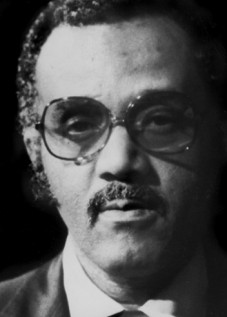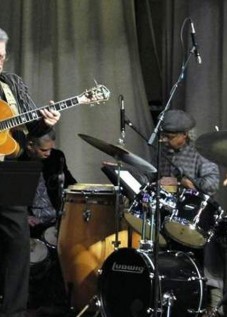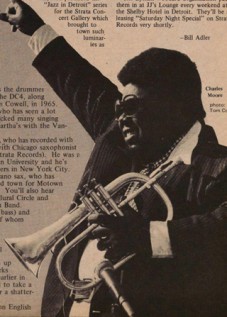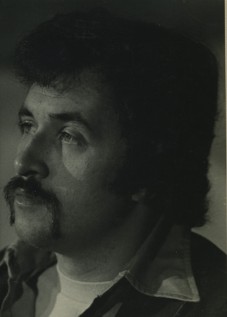Dialogue with Archie Shepp
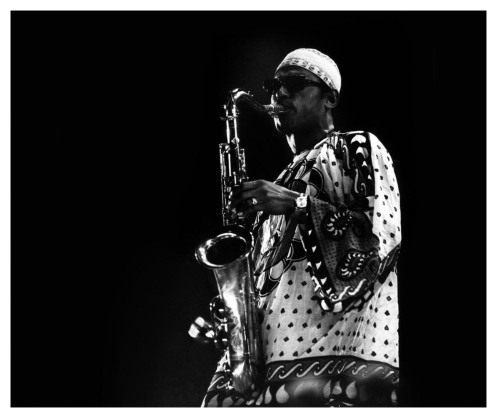
Archie Shepp. Lecco, Italy, 1967.
Moreover, these were artists with a social conscience. They were keenly aware of the Civil Rights Movement, and they were participants and contributors to the cause. As African- Americans across the country were creating a social revolution, Archie Shepp and other musicians were creating a musical revolution. Song titles like Shepp’s “Malcolm, Malcolm – Semper Malcolm”, reflected this awareness. Perhaps this political agenda was one of the factors that prevented free jazz from reaching a broader audience.
The music and ideas of Archie Shepp have been much examined. His impact on jazz has been substantial from both a musical and political perspective; his artistic vitality and social understanding – as a saxophonist, composer, poet, playwright and educator – have continued through to the present. Today, Shepp’s music seeks to explore more traditional forms of jazz, while incorporating ideas advanced in the ’60’s.
My own interest in jazz began ten years ago, when I enrolled in one of Shepp’s classes at the University of Massachusetts at Amherst. I was originally interested in the blues, but I rapidly became focused on jazz and other African-American musical styles. Shortly thereafter I spent three years managing nightclubs and presenting jazz concerts. I have worked with Shepp in a variety of contexts for more than a decade: as Student and teacher, as club manager and artist, and now as interviewer and subject.
Scott Cashman: I’m very interested in discussing with you some things that may influence the style of music that you play, some of the things that you feel affect you and that you respond to . It’s particularly interesting to me that you’re in great demand in Europe. Compared to America, it’s a whole different audience with a different perspective.
Archie Shepp: Yes, the audience is so important to Negro music, especially the element of call and response. I find that here in the States, audiences are generally less knowledgeable, from the cognitive point of view, though they are emotionally more receptive. Americans, particularly white Americans, have spent so much time in the company of each other that I find that when I play for an American audience it’s a much more intimate experience. It’s a language that by now everybody understands, especially because of rock and roll and popular music. A whole generation of young whites have involved themselves with traditional Negro music. What is important to them are the focal aspects: the beat, the blues scale. Jazz was absorbed here even though there was no particular movement or philosophy which went with the post-’60’s music. There was never anything comparable to the European movement in this country. In Europe it evolved out of a whole intellectual process. The European intellectuals were and are very much into so-called avant-garde music. In America, for a brief time, people who followed Coltrane were studied and considered important, but it didn’t last long. The result is that the kind of music I played in the ’60’s is completely dismissed in this country as a wrong turn, a suicidal effort.
SC: With the avant-garde movement in Europe, is it not so much a question of magnitude – that the movement was bigger there – or is it just that it lasted longer?
AS: Well, I think, too, it’s because of the climate in Europe. Their historical, cultural and aesthetic values were formed from a critical perspective that was, at first, Anglo- and Francophilic: with Hughes Panassie, Andre Hodeir, Ernst Ansermet, Eric Borneman. some of the major artistic movements exploded there: cubism, Stravinsky’s “Rite of Spring”, the poets – Rimbaud and all those. There is a tradition of intellectual and aesthetic radicalism in Europe which is also peculiarly related to politics. Beginning in the 1960’s, I think Europeans – particularly the European Left – saw me as a spokesperson for the avant-garde because I tended to articulate some of the political frustrations that black people felt in America at the time, vis-a-vis people like Martin Luther King and organizations like the Black Muslims. It was a particularly interesting and exciting time, and the European political and artistic establishment was turned on by the Civil Rights Movement and the artistic revolution that was becoming a part of jazz. What evolved here in the United States is almost an anti-climax to the import of the signal that was sent out in the ’60’s. I mean, during that period we were able to engage another aesthetic idea. At least we were able to expand our perceptions of things. Blacks and whites who had formerly listened to black music exclusively for entertainment started to listen seriously to John Coltrane, Ornette Coleman, Cecil Taylor, Albert Ayler and myself. I think we expanded the horizons of the music, and white youth were politicized by us as well as by the Civil Rights Movement. Jerry Rubin and those guys were spinning off another ethic, which took the conventions of its own independent line as far as politics was concerned, but within that milieu there was a possibility for a really interesting synthesis to evolve. In a very significant sense, John Coltrane was perhaps the greatest radical of the avant-garde. It couldn’t be far enough out for Trane. Trane is the guy that created us, in a way. He believed in us. He was our mentor. To view it from an historical perspective, he freed black music from the entertainment syndrome. Black artists had always been told, there was a certain amount of “time” in which to do your thing. Coltrane was an artist who decided to play not simply because people wanted to be entertained. He could, as Elvin Jones has pointed out, play a matinee for three hours without a break. He played what he felt. The way Stravinsky might have thought on paper, he did in his head. That was his genius – improvisation. It is amazing that this kind of process could have evolved out of the black experience. The question is, can we accept this? Does a black artist have the right to demand our attention the way we attend to beethoven, Stockhausen, or Phillip Glass? It’s a challenge. Coltrane’s challenge is, I think, still before us. Today, music is visual. You get a show where people are jumping up and dancing, but it’s not a critical event in the sense of profound catharsis. Essentially it’s celebratory. Coltrane was celebratory in that original sense. He was digging for something; he was looking for that other dimension and he often found it. With music he did create a fourth dimension; the sound was something total – at some points fear. He could combine all of those elements, audience participation, the response mechanism; it was like church sometimes with Coltrane’s performance. What was interesting was that the experience informed members of disparate people as an audience, blacks and whites – and this was not an easy music to listen to. That it didn’t survive here in the states is, I think, partly because we tend to be very conservative politically. No real movement like that which began in the ’60’s, could really take root in this country. For it to become pervasive in this land without, a total political, aesthetic, cultural revolution, uniting races and that sort of thing, would be difficult. So maybe some of those things were much easier for Europeans to accept, especially the political and cultural relationships. They really didn’t have the same hangups.
SC: So, when you go over to Europe do you change the arrangements or whatever style of music you play? Would a club date in Paris be different than one in New York?
AS: To some degree, yeah, because I have to play a certain number of originals that might be considered avant-garde material. I realize though, that only a few people in the audience actually know what that music is, or understand it. More and more I’m playing for the sons and daughters of my erstwhile patrons. It’s a new generation of young kids who come to hear me. If, in fact, I play for them the music that I played for their parents in the ’60’s, I’d run them all out of the place (laughs). So I try to give them just a little taste of it.
SC: Do you enjoy doing that?
AS: I do. Today when I play what they call “outside”, that is, in the avant-garde style, I get a real feeling form that. I play less and less that way because it’s not commercially viable. For another thing, there are not too many people that I feel play convincingly in that style. The musicians I’d choose to play with today would be guys like McCoy Tyner and Elvin Jones. Men who know where they’re coming from, who have synthesized the roots of the blues, who make that kind of music come to life. Even if I’m playing “outside”, the music has to say something – as Lester Young said, “to tell a story. ” When you’re running off, playing “outside” for its own sake, you can miss the quintessential quality of the medium. As much as they may criticize us for what we did back in the ’60’s, you can’t say the music was dull (laughs). You know, people would comment, “That guy’s crazy, my two-year-old kid could play that. ” But they were moved passionately either for or against it.
SC: Is that emotional aspect an outgrowth of black culture?
AS: Let me put it this way. Negro music and culture are intrinsically improvisational, existential. Nothing is sacred. After a decade, a musical idea, no matter how innovative, is threatened. Just look at what’s happened since Parker and Coltrane. The reason is that black music thrives on change. We’ve got to keep trying new things just to stay around. It’s hurt us in a way because we haven’t been able to develop retrospective, re-creational institutions that would preserve our culture the way others have. So, we’ve had to be cultural guerrillas, in a sense, just in order to survive.
SC: To me it seems a given that when you move out of the mainstream you are also confining yourself to a limited audience: those that can seek out and accept new things. Of course, this has commercial and financial implications. Was that something that you were aware of when you started working with Cecil Taylor, and then going out on your own and playing music that was not the mainstream jazz of the time?
AS: Well, I’ve been a rebel all my days. I didn’t give a damn about money (laughs). Me? Actually, I felt that I was somewhat politicized musically, radicalized by Cecil Taylor. I was a very conservative guy coming out of Philadelphia. I had done my homework, had a fair knowledge of piano and started out on clarinet before I went to the saxophone and so on. I listened to the inside players of the day: Wardell Gray and Sonny Rollins and all those cats, Bud Powell and Bird. And when I met Cecil Taylor it was a complete transformation of musical identities. All the tenets that I had grown up with were thrown out the window. So, I was just a young guy, maybe with an idea, and Cecil Taylor, himself a rebel, would take a chance on a guy like me. It turned out to be a very symbiotic partnership. I learned a lot from him. Not so much specific musical things, but more importantly I was impressed by the enormity of his intellect. His complete sense of freedom, unfettered in the sense that there were no set parameters or boundaries. I was right on the frontier, on the cutting edge of music with him. Black music has become a commercial commodity. Live performances are not so accessible as they were previously. It use to be possible to go to the bar on the corner and hear music. It was available for a fifteen cent beer. Kids were playing it and the entire community was involved in its creation. That’s all gone now. Music has become something else. I mean, what is the difference between Madonna and Prince, or Boy George and Michael Jackson? They are all dealing with the same fundamental ideas: blues, Afro-Latin rhythms.
SC: It seems that the only real difference is coming out in rap music.
AS: Rap is probably the most original. Here I find an amazing phenomenon. These kids don’t learn poetry in school. Nobody taught them iambic pentameter or rhymed couplets. They, unfairly, haven’t read Pope or Dryden. Yet here they are, spinning this stuff off and making money reciting poetry. On the one hand, I think that is really commendable and exciting, but I also find it very limited. For example, I’ve done a few poems, which I don’t think the black community has heard much of (laughs). My work isn’t as accessible as Miles Davis’ or Herbie Hancock’s. Most of the recordings that I made were done in Europe. They aren’t popular recordings in the sense that their intellectual content renders them less marketable to a mass audience. In rap music, even though the element of poetry is very strong, so is the element of the drum, the implication of the dance. Without the beat, its commercial value would certainly be more tenuous. In fact, without the orchestral and theatrical concepts that evolved with it, the lights, the spectacle, etc. , it’s doubtful what you would have. Denuded of all accoutrement what you would have is rapping, which perhaps wouldn’t be as exciting to the mass of our youth. Also, there is the dimension of the media, television, that thrives on the youthful image, the pretty girl, the handsome young man or the bizarre: The Fat Boys, King Sized Dick and the like. This is the nature of pop art in our country today. Much of it is defined by Negro spirit and the thrust of black art. This is presented to us as Jefferson Airplane or the Rolling Stones. It’s not clear who actually created all this. It’s not made clear and it never was. The packaging of black art forms is a highly sophisticated and insidious business.
SC: I think there is another point, that rap has drawn on traditional elements like tap, minstrelsy and the church. I heard Playthell Benjamin and Amiri Baraka speak a couple of weeks ago and their point was that rap is not anything new. They pointed out that rap is related to the form called “hambone.”
AS: Very similar in style.
SC: The difference to me is that rap music is no longer art as art, but art as commodity. While accepting the fact that it started out on the streets, these people who are on the top now have the best managers, the best agencies; they are packaged and sold to television, and they make good-looking videos, really expensive performances.
AS: Rap actually took root in the Negro community, and then in the Hispanic community, long before it impacted on the larger American community as a whole. I can even remember, maybe five or six years ago, being in an airport in Switzerland and some young kids, all European, with their caps turned around were breakin’ and doing the thing. And I thought, “Gee, it’s all the way over here!” Partly it’s television and the media. On the other hand, it’s what you say: There is something very functional about, and there has been, about Negro art, Negro music. The blues player speaks not for himself, but for every man. To that extent, a rich man could walk into a Muddy Waters concert and walk away feeling catharsized. Even though Muddy might have been singing about sharecropping, he announces the whole community’s blues. So, rap has that quality, for youth anyway; it’s a kind of blues element. It’s physical, almost gymnastic. It speaks to you organically. Rap grows out of what young people really are today, not only black youth, but white — everybody. There is a certain genius to it. But does it speak to erstwhile generations? Now part of the problem may be that these young musicians are not getting a broad sense of continuity from previous generations. Like the Last Poets, I think that my poetic style could have enormous implications for younger poet-musicians. It is discouraging to me that they probably won’t be encouraged to hear my work, largely because of its political content. And to that degree I question, not the validity of rapping, but its limitations. It is primarily designed for commercial consumption, interests, popular tastes, though the people who do it accept willingly that they are accomplices to their own exploitation. One may speak against drug abuse and other social problems, AIDS and so on, because rap has that quality, a very topical quality like the blues, which is essential. It addresses the day to day problems with music. On the other hand, to take it that extra step and treat rap as real poetry — for example, to change the rap rhythms from rhymed couplets and utilize all the poetic elements that are accessible — raises other problems. Are we ready to accept that from Negroes? Are Negroes ready to create this, given the limited education that our young people receive in school? They are not about to come out in iambic pentameter, or start reciting sonnets to rap, not because they wouldn’t, but because they don’t know anything about that. So, rap, though it comes to us with much that is commendable, it also has many built – in limitations, some of which I would consider even racist or chauvinistic because these youngsters are never encouraged to go outside what sells.
SC: That seems to be true. Most of what you see of rap on MTV and what not is pure silliness, which has its place, but it becomes distressing and even boring when it is exclusive. It is rap, as a musical form, but its content generally does not differ from most other “popular” or mainstream music. People who are making serious political statements, and who might be ruffling a few feathers, people like Public Enemy, are not on television. you can’t see that. You have to go out and buy it if you want to hear it, and that puts it in a whole different arena. That is not the stuff that people are getting introduced to.
AS: Right, so there is a formula.
SC: And again, it’s like jazz as well; the artist has to decide. If they want to do that kind of stuff they have to know up front that they are not going to get the same financial return that other artists are going to get. And that is a decision that you’ve got to make right up front.
AS: And there is no guarantee that if you make that decision that you are going to get over. A lot of guys turn to rhythm and blues and pop music and never make the big buck. I was talking to my kids in class and a couple of black students endorsed the idea that it was a good thing that black and white music was coming closer together. In the ’60’s we might have argued, “Look brother, this is our thing; these people are ripping us off. ” Today those arguments seem less credible, less cogent when everybody is doing it, when Negroes are borrowing music from whites and whites are borrowing from blacks. The question of clear theft is not as evident as it was in the ’60’s. When we thought of Lee Konitz and Charlie Parker, or Stan Getz and Sonny Rollins, there was a much clearer separation in style and aesthetic: the more ethereal, cool music on the West Coast with Chet Baker and all those guys vis-a-vis the hard bop on the East Coast. black music was a strongly identifiable ethnic movement. Thelonious Monk was quoted as saying, “We were trying to keep the white boys from learning what we were playing.”
SC: It’s interesting you bring up that Monk statement. In many of the interviews that I did I’ve found that the black musicians didn’t feel much tension about working with white musicians. It almost seemed like a natural thing to do. But as I talked to some white musicians, well, let me read you a quote from a white musician I interviewed that I think is telling: “I find when I’m sitting on stage playing the music, that I feel I’m being disassociated sometimes, when they say ’black classical music. ’ I feel embarrassed for not being black so that I can play the music properly, you know? And I don’t want to put them in that position, so I don’t want them to put me in that position. But you know, I have to go along with it. ” There seems to be a certain underlying tension for white musicians that is almost that white guilt type of thing.
AS: Well, you know, Negro music is often misunderstood. It is a tradition, a community experience, and not an individual’s experience. Very few black or white musicians understand what the process is. The seeds of this music are not gathered simply by learning to imitate an individual, a Mahalia Jackson, or John Coltrane, or learning to play in the style of Count Basie. By that I mean, if you were to look at the roots of a Count Basie you would have to go back to Lucky Roberts and Fats Waller and probably to dozens of others we could name whose music he loved much better than his own. The black aesthetic flows out of the oral tradition. This is often misconstrued by players who themselves are informed through an academic process. They miss the meaning and the implication, the functional qualities that derive from the oral tradition which, ultimately, is a part of the Negro aesthetic. What I think is confusing and threatening to whites, especially those in this country who feel that this is their music too, is that somehow they associate the race of the player with the type of music expressed, regardless of cultural origins. Especially when the player is Caucasian. For example, even though Stan Getz unmistakably imitates a Negro musical style, we tend to credit his ethnic origins rather than the originators of the style itself. So, when you say black classical music, some white people feel threatened because they can’t accept that they are spectators, in a sense, in another people’s arena. When Grace Bumbry plays the role of Madam Butterfly, she does not alter the authenticity of Western European musical tradition because she is black, not does it matter that Madam Butterfly (the character) is Japanese. We are all aware that she is singing in a European style and that the musical techniques she employs derive not only from Puccini, but an entire Western musical tradition. White people are participating in a tradition whose authenticity and parameters lie outside the European tradition. When Roswell Rudd was playing trombone with my band back in the ’60’s, I didn’t think of him as black or white, but I knew that he was a white guy playing Negro music. I don’t think he had any question in his mind about it either. And I’ll say the same for Charlie Haden. They are two of the best white performers that I’ve heard in the Negro musical idiom. Part of the reason for it is the fact that thy know who they are. Gershwin, I think, understood very well what he was doing. That accounts partly for his artistic success. I don’t think he ever thought of himself, as a Negro, but he clearly perceived that there was such a thing as Negro music. His knowledge of himself, his acceptance of his outsider status was just that touch that elevated him to the very unique stature he achieved. He was not simply a Negro imitator, but an artist who culled from Negro music another form of expression.
SC: Really, the way I see it is that it’s not my tradition, but I experience an interaction with that tradition.
AS: Sure, and this is America. Despite racism and all of the rest, a few performers outside the Negro race were distinguished in the idiom and are well remembered by their peers — Bix Beiderbecke, Bill Evans, the pianist, Gil Evans, Al Haig, Scott LaFaro and others. But in the case of other nationalities, we can admit, for example, this is an Irish folk song or Chopin was a Pole; yet when Negroes begin to express their identities as separate, that’s a problem. We are encouraged to think of ourselves as Americans, except in certain situations. There is a peculiar ambiguity about race in this country. A black guy fights in Vietnam, he’s American. But when he has to be buried, here in the U. S. , in a grave that is reserved for white folks–he was an American, now he’s a Nigger. If we want to talk about “jazz” as a cultural heritage, it’s “American”. On the other hand, if a Negro–say, Duke Ellington–is nominated for a Pulitzer Prize, which actually happened, “jazz” suddenly assumes the color of its creators and a badge of international honor, and pride reverts to a stigma of shame. Thus, when it’s in everyone’s interest, the black enjoys a tentative “American-ness. ” Yet in many social and economic situations we are made to be very aware that we are not a part of the mainstream. This amounts to no more than the conferring of an “instant whiteness” on a social fabric, which lasts only until the next laundering. Radio programs like Voice of America add to the confusion. Such programs give the impression that we are all one big happy family. But there is enormous discrimination and racism within the realm of culture, music. dance–right here in the United States of America. White Americans have been influenced greatly by the Negro music idiom, Negro culture, and Negro speech, so the melting pot is a multi-layered phenomenon. And our music, our popular music really spells it out, going all the way back to Elvis Presley and before. White youth have always been enamored of Negro folk music and culture. This has brought us together in a way that words, and politics and laws probably never could.
Source: Scott Cashman | Spit: A Journal of the Arts
on Archie Shepp.net
Tags: Archie Shepp, Interview, Jazz



